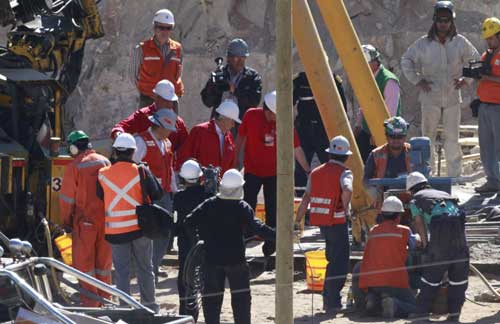Chile choreographs dramatic finish to rescue saga
The miners will be closely monitored from the moment they're strapped into the claustrophobic steel tube to be hauled up the smooth-walled tunnel. For the last six hours before surfacing, they'll drink a special high-calorie liquid diet prepared and donated by NASA, designed to keep them from vomiting as the rescue capsule rotates 10 to 12 times through curves in the 28-inch-diameter escape hole.
As each miner is hauled up, a small video camera in the escape capsule will be trained on his face so rescuers can watch for panic attacks. The miners will wear oxygen masks and have two-way voice communication.
Their pulse, skin temperature and respiration rate will be constantly measured through a biomonitor around their abdomens. To prevent blood clotting from the quick ascent, they took aspirin and will wear compression socks.
The miners will also wear sweaters because they'll experience a shift in climate from about 90 degrees Fahrenheit underground to temperatures hovering near freezing if they emerge at night. Those coming out during daylight hours will wear sunglasses.
Seconds before each miner surfaces, an ambulance-like siren will sound and a light will flash for a full minute. Officials are calling this the Genesis alarm, meant simply to alert doctors that a miner is arriving.
Many steps have been taken to protect the emerging miners from the media. Photographers and camera operators will be able to see light but little more from a platform set up more than 300 feet (90 meters) away.
After initial medical checks and visits with family members selected by the miners, the men will be airlifted to the regional hospital in Copiapo, roughly a 10-minute ride away. Two floors have been prepared where the miners will receive physical and psychological exams and be kept under observation in a ward as dark as a movie theater.
Chilean air force Lt. Col. Aldo Carbone, the choppers' squadron commander, said the pilots have night-vision goggles but will not fly unless it is clear of the Pacific Ocean fog that rolls in at night, a notoriously thick, humid blanket Chileans call "the camanchaca." Night traffic on the mine road was banned as a precaution to keep headlights from interfering with the night-vision goggles, and to keep the road clear for ambulances should they be necessary.
Families were urged to wait and prepare to greet the miners at home after a 48-hour hospital stay.
"In Chile, we have huge families," Manalich said, joking that if they weren't stopped, entire football teams of people would crowd into the hospital's wards. He also said that no cameras or interviews will be allowed until the miners are released, unless the miners expressly desire it.
Officials have drawn up a secret list of which miners should come out first, but the order could change after paramedics and a mining expert first descend in the capsule to evaluate the men. First out will be the four miners best able to handle any difficulties and tell their comrades what to expect. Then, the 10 who are weakest or suffer from hypertension, diabetes, dental and respiratory infections and skin lesions from the mine's oppressive humidity.
The first miner to be rescued will be Florencio Avalos, according to his mother, Maria Silva, and uncle Alberto Avalos, who said Pinera told them that.
The last miner out, according the list, will be shift foreman Luiz Urzua, whose leadership was credited for the miners' survival during the 17 days when they were utterly closed off from the outside world. The men stretched an emergency food supply meant to last just 48 hours by taking tiny sips of milk and bites of tuna fish every other day.
 0
0 







